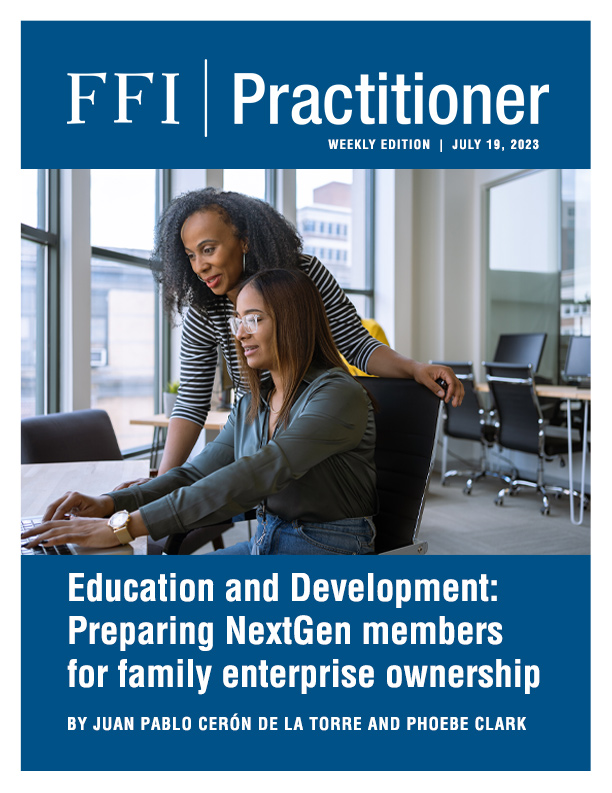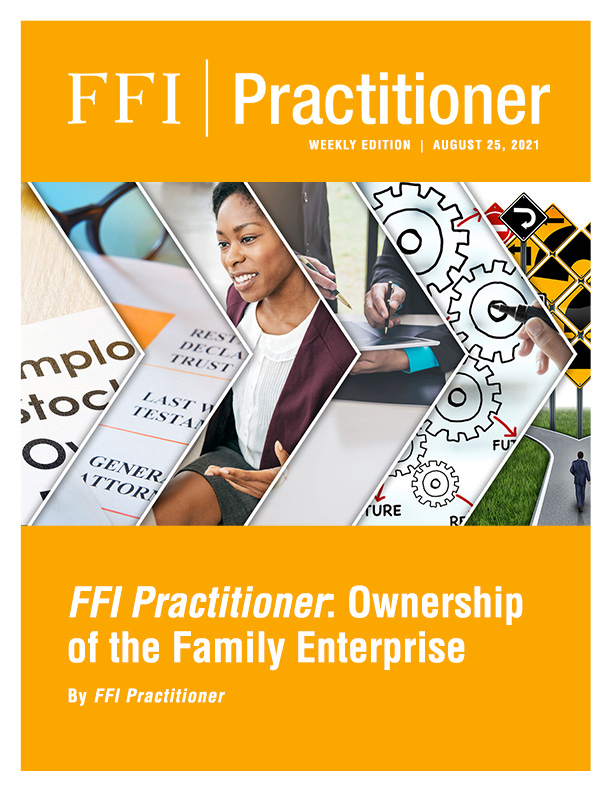
To effectively address the topic of preparing future family enterprise owners, advisors and their clients can consider three fundamental aspects of education:
- The family’s circumstances, since they will determine the methods to be used
- The family’s values, which will serve as a guide for the advisors and the family
- The standards or rules applied to accomplish such a difficult task
The Family’s Circumstances
The nephew of a prominent family business founder decided to drop out of university. His parents, concerned about his future, encouraged him to ask his uncle for a job in the family business. His parents helped him approach his uncle with the request that a managerial position be created for him, with his salary to be decided by the Family Council. When word of their conversation got out to the wider family, conflict broke out among the three family branches. Family members disputed the young man’s eligibility for such a role and demanded similar consideration and compensation for individuals in their branches. The business founder, stuck in the middle of all this and concerned at the scale of the developing family rift and its impact on the business, sought advice from external consultants.
The Family’s Values
One way to approach next generation education is from a family values perspective. How do the core family values relate to the business, the family wealth, and the family culture? Defining and communicating the core family values is not enough—family members inculcate values in the next generation by practicing, not preaching. This means members of the senior generation(s) really living their shared values and serving as a positive role model for the younger generations. How can advisors help their clients see to it that money and economic resources help the successive generations of entrepreneurial families, rather than harm them?
The business founder in this case example learned the hard way about the importance of educating children from a young age about privilege, family legacy, and how to handle their wealth. Knowledge, skills, and attitudes are formed early within the family, and to a large extent by way of observational learning. Teaching by example is an effective way for parents to influence their children. Even unintentionally, parents’ behavior gives children a point of reference for their own behavior.
A widely shared concern among founding members of business families is how to raise their children so that they don’t develop an attitude of entitlement towards money, profits, and/or inheritance, but rather with a proactive desire to work, to contribute, and to protect and grow the family’s assets, so that they can become stewards of their wealth. Whether or not the children ultimately become prudent and resourceful administrators of the family wealth is not totally under the parents’ control. However, there are things that families can do to make it more likely that the next generation grows in a positive direction, developing self-esteem and competencies in alignment with the family’s values.
The Standards and Rules
In the example case, the consultants facilitated a series of family meetings, creating a safe space for family members to share their concerns. Together they came up with a set of ownership policies, including a family employment policy, to clearly define the terms and conditions of employment for family members. These included requirements for entering the family business, such as the following:
- Compatibility with the business vision
- Commitment to and respect for the business, employees, and family values
- External experience and knowledge of the business and financial environment
- A comprehensive induction process and career development plans
- Management programs and training
- Clear evaluation processes and job descriptions
Sidebar
Ownership of a family enterprise is a dynamic and complex undertaking as well as an ongoing topic of research and debate within the family enterprise advisory field. This edition of FFI Practitioner highlights a collection of editions covering three elements of ownership – succession, structure, and strategies.
- Responsible Ownership: It is essential that successors develop attitudes that ensure their performance as exemplary leaders.
- Visionary Entrepreneurship: Succession implies the ability to maintain and increase value, which is a consequence of entrepreneurship and risk-taking.
- Competence: Being capable, knowing what to do and having the capacity to do it, is required of successors.
- Prudent Ownership: Knowing how to be an owner is a virtue that is achieved through education, practicing sensitivity, and good judgment.
- Trustworthiness: For succession to be effective, it must be led by a responsible and trustworthy person who has integrity and values that guide him or her.
Helpful Steps for Clients
Families that identify effective ways to contribute to the formal education of the next generations and proactive development of succession plans often take the following basic courses of action:
- Succession Planning and Clear Rules: Having a clear succession planning process and training program for successors will improve the probability of success of the strategy to be implemented.
- Intergenerational Engagement: The older and younger generations both have active involvement in important matters. This means working together, fostering open communication, and respect when it comes to activities related to family wealth, shared family values, and family legacy.
- Training: Training and educational activities so that the next generations are able to develop their abilities to manage their inheritance and learn about the differences between managing, maintaining, and growing their wealth.
- Sense of Belonging: As a family, acknowledging and addressing the important task of defining and developing family members’ responsibility as stewards of family wealth, their participation in family governance of the company, and in mature and responsible decision-making.
Without an effective plan for the education of possible successors, encompassing the formation of character and the accumulation of significant experiences, the worry about succession looms large.






